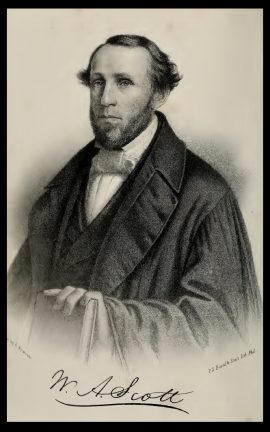By Barry Waugh - Posted at Presbyterians of the Past:
William Anderson was born to parents of Scotch-Irish descent named Eli and Martha (Anderson) Scott, January 30, 1813, at Rock Creek which is located south of Nashville in Bedford County, Tennessee. The Scotts found frontier Tennessee a challenge but then after moving to colder Illinois for two years they returned. The cantankerous mode of travel was a flatboat as they made a harrowing journey down the Mississippi River to settle on Big Creek near Memphis. Eli’s two older brothers, John and Joshua, had moved also providing mutual support as all the Scotts settled the land. The more prosperous brother, Joshua, hired a tutor to teach all the cousins in their own private schoolroom. William spent his youth on the family farm until at sixteen years of age he left to attend Cumberland College. The college had been established in Princeton, Kentucky by the Cumberland Presbyterian Church. A classmate of Scott, James A. Lyon, described him bluntly.He is remembered as a great, big, fat, serious, sober, ruddy, smooth-faced, awkward boy (yes, boy), with now and then a gleaming from his eyes! And for his ambitious diligence in study, and for a voracious appetite for books. Every dollar that came into his hands was laid out in books, until he had not, any longer the wherewith to meet his current expenses for board and clothing. (Drury, 44)
The bibliomania afflicting Scott is reminiscent of that of Thomas Smyth. Scott graduated Cumberland College in 1833. He suffered financially for a number of years and his love of books may have contributed to the dearth of funds.
Scott moved to Princeton, New Jersey for seminary. He was on campus from February through the summer session of 1834. He had trouble adjusting to Princeton because it was larger and more formal than Cumberland College. Master linguist J. Addison Alexander took a special interest in Scott introducing him to the Syriac and Arabic languages. When Scott left Princeton he intended to return and complete the curriculum but limited funds, the travel distance, and a romantic interest that would lead to marriage ended his formal studies.
